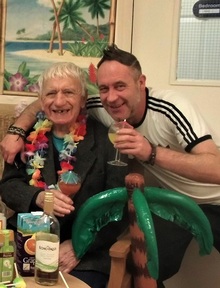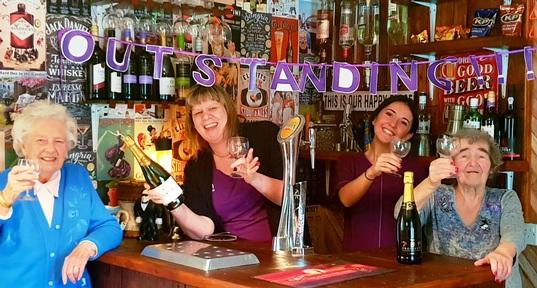Huntington's Disease occupational therapist shares expertise with top scientists at The Hague
Kirsty Page, an occupational therapist from Badby Park, a care home for adults with complex needs, has been sharing her clinical knowledge on Huntington’s Disease with scientists at the European Huntington’s Disease Network (EHDN).

She was the only occupational therapist from the UK to attend the international conference which was held at The Hague in the Netherlands.
As founder of the UK’s Occupational Therapist Specialist Interest Group for Huntington’s Disease, Ms Page revealed how certain interventions can reduce suffering for patients.
Amongst other symptoms, people living with Huntingdon’s Disease often have disturbed daily routines where they sleep during the day and are awake at night, particularly in the early stages of the disease. This can provide challenges to carers and as an occupational therapist Ms Page gave advice on how to best deliver care and manage these changing circumstances.
Ms Page spoke to carehome.co.uk about how she got where she is today
Her career began with a BSc (Hons) in Occupational Therapy at Oxford Brookes University in 1994, and she then went on to work with adults with acquired brain injury for 10 years in a hospital setting at St Andrews Healthcare in Northampton. This is where her specialist interest in Huntington’s began and whilst at St Andrews she worked on a specialist unit for adults with Huntington's Disease for seven years.
What attracted you to the role of an occupational therapist
“Ever since my mother took me to an open day at the local general hospital as a child I have had the desire to work with people. Then following a work placement during my A- Levels with the OT team at a care centre for the elderly I realised that OT would allow me to help people in so many different ways and ultimately make a difference to their quality of life.”
What do you specialise in
“I’m the senior occupational therapist at Badby Park, a specialist nursing and rehabilitation facility for neurological illnesses and disorders. I have a special interest in Huntington’s Disease and I am a member of the Huntington’s Disease Association and the OT specialist section, neurological practice. In 2009 I joined the European Huntington´s Disease Network (EHDN) and have worked with UK and European OT's to produce best practice guidelines for OTs. We are also about to launch the Occupational Therapy Clinical Tips for Huntington's Disease.”
What is a typical day for you
“The day starts at 8.30am with patient handover which covers how the night was for the residents. I pick up emails and any urgent referrals such as changes to residents’ needs or equipment provision.
“A typical morning could include an assessment of someone’s washing and dressing skills, including any equipment they may require. Review bed positioning or seating guidelines and made any required adjustment to a wheelchair or on-ward training for carers.
“Late morning may involve taking a resident out into the community to offer an enriching environment and an activity which promotes quality of life activity for the individual such as going out for coffee. This gives me the opportunity to assess changes in outdoor mobility, memory skills, money management, interactions with others and accessibility issues with stores and the environment.
“After lunch, I run an inter-disciplinary group session with the Speech and Language Therapists and a newspaper and coffee group for residents which aims to improve social communication and interaction. It also helps develop turn taking and developing compensatory techniques for memory and assessing residents’ functional skills.
“The day ends with writing up notes, amending care plans and liaising with the inter disciplinary team to make sure we are all aware of any patient’s changing needs.”
What are the challenges of your job
“An OT must be able to adapt quickly to ever changing residents' needs and situations, particularly when working with residents with neurological illnesses and disorders. This means that no day is the same and the day you planned will be very different to the reality.”
What are the highlights of your job
“As an OT I have the ability to make a difference to the environment of the care home, ensuring it is safe and an enriched place for residents to live. I work with a great group and it is fantastic to be part of an innovative team. It’s very satisfying to work with both residents and their families and to build up a rapport with all of those involved in the care of a resident.
“The variety of the job, rehabilitation and discharging back into the community and being able to ensure the safety and comfort of people with deteriorating conditions is very rewarding.”
What was it like presenting at the European Huntington's Disease Network (EHDN)?
“It was a fabulous honour and a great experience. I’ve made some very valuable contacts and the experience has increased my knowledge of the disease and treatment interventions, which will in turn help me make a difference to those residents with Huntington’s Disease. The feedback we received from senior European OTs and respected clinicians from around the UK and Europe was very positive.
“When there is a better understanding of what it is like to live with the disease we can provide more personalised care and help alleviate some of the suffering that patients experience.”
What advice would you give to someone wanting to become an occupational therapist
“The OT role is very diverse so I would recommend talking to and working alongside an OT, shadowing them to get a full understanding about the specifics of their role. The College of Occupational Therapy has excellent advice on OT as a career and how to become an OT which is a great resource.”
Badby Park neurological centre in Daventry provides rehabilitation, long term care, respite and palliative care for people with neurological illnesses, acquired brain injuries and spinal injuries. In May the centre was rated Good following an unannounced inspection.
Latest Innovative Care News
 13-May-19
'Pink drink' brain cancer treatment rolled out across NHS in memory of Baroness Jowell
13-May-19
'Pink drink' brain cancer treatment rolled out across NHS in memory of Baroness Jowell
 25-Apr-19
Louis Tomlinson helps 83-year-old who lost wife to dementia complete bucket list
25-Apr-19
Louis Tomlinson helps 83-year-old who lost wife to dementia complete bucket list
 22-Mar-19
UK's top care home handyman takes residents to pub for pie and pint
22-Mar-19
UK's top care home handyman takes residents to pub for pie and pint
 12-Feb-19
Michael McIntyre's jokes tested to see if they stop elderly catching flu
12-Feb-19
Michael McIntyre's jokes tested to see if they stop elderly catching flu
 07-Jan-19
'We were lucky to find it': Family's delight as care home is rated Outstanding
07-Jan-19
'We were lucky to find it': Family's delight as care home is rated Outstanding